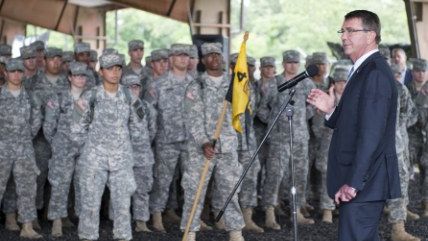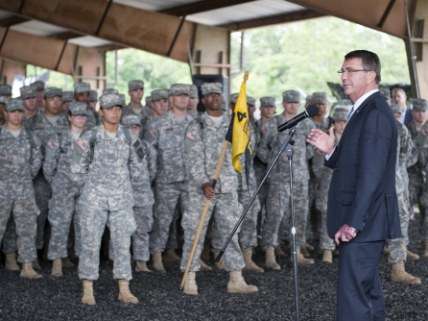Military Announces Its Own Transition Plan to Allow Transgender Troops
Yes they can now serve openly, but the regulations will be complicated.


As leaked earlier in the week, today Defense Secretary Ash Carter formally announced that the United States military is ending its blanket ban on transgender people serving in the forces.
As of today, transgender troops will no longer be discharged from the military or denied reenlistment "solely for being transgender individuals." That use of "solely" as a modifier there is important because it's an acknowledgement of both the pro and con arguments: There's nothing inherent about being transgender that should disqualify someone for military service; but the totality of that person's experience and their ability to adjust to both what's going on within them and the military's need for conformity requires analysis.
There are a whole bunch of "next steps" in the Department of Defense's fact sheet about this transition. In three months, military handbooks will be updated to acknowledge transgender troops, medical "guidance" on transition care will be hammered out, and service members will be able to officially change their gender on their personnel records. More steps deal with the complexities of gender transitions will be rolled out over the next year.
Beyond that, it's important to note that military does not appear to be buying into any sort of "gender is just a construct" or "gender fluidity" dynamic. Transgender troops will be expected to identify as male or female, just like everybody else. There's nothing to suggest that there will be new pronouns, nobody will be able to declare themselves "non-binary," and nobody will be able to demand to be called "they." A transgender person will be expected to live and conform with the appearance and guidelines of the gender they've become. This doesn't necessarily mandate reassignment surgery but will require living as the chosen sex permanently.
USA Today notes that as part of the research before implementing these changes, the military did evaluate the likely impact on readiness as well as costs to the military to pay for medical treatment, based calculations of the number of likely transgender troops:
There are between 1,320 and 6,630 transgender troops in the active-duty force of 1.3 million, according to Agnes Schaefer, the lead author of a RAND Corp. study commissioned by the Pentagon on the issue. Of those troops, RAND estimates that between 30 and 140 would seek hormone treatment, and 25 to 130 would seek surgery. The estimated annual price tag: $2.4 million to $8.4 million, per year.
The effect on readiness to fight, or deploy, is anticipated to be small, Schaefer said. Transgender troops would be unavailable to deploy between 8 and 43 man years annually, a measure of military readiness. The military overall has 1.2 million man years. The Army has about 5,300 non-deployable man years.
"The bottom line is that we think it will be minimal," Schaefer said of the effect on military readiness of lifting the ban.
For some context, America's annual defense budget is around $600 billion.
A source gave Dominic Holden at BuzzFeed some indications of what some of these new policies might entail for transgender citizens who want to join the military. Much of the policy developments happening right now focus on transgender people already serving. Of note, if his info is accurate, an openly transgender person who wants to join the military may be expected to complete the transition before joining. There's little foundation to suggest that transgender people will go running to join the military in order to get free treatment or that such behavior would be permitted.
On the other hand, if they did, is that any different than people who join the military for any other economic reason? How is that different from joining the military to pay for college? As long as they're still expected to conform to military policy and perform up to the same standards as their nontransgender peers, there really shouldn't be a problem. And if it turns out a transgender military member is emotionally or mentally unfit for service in other ways, that's still no different from other men and women who end up washing out for being unable to adapt or conform.


Show Comments (65)